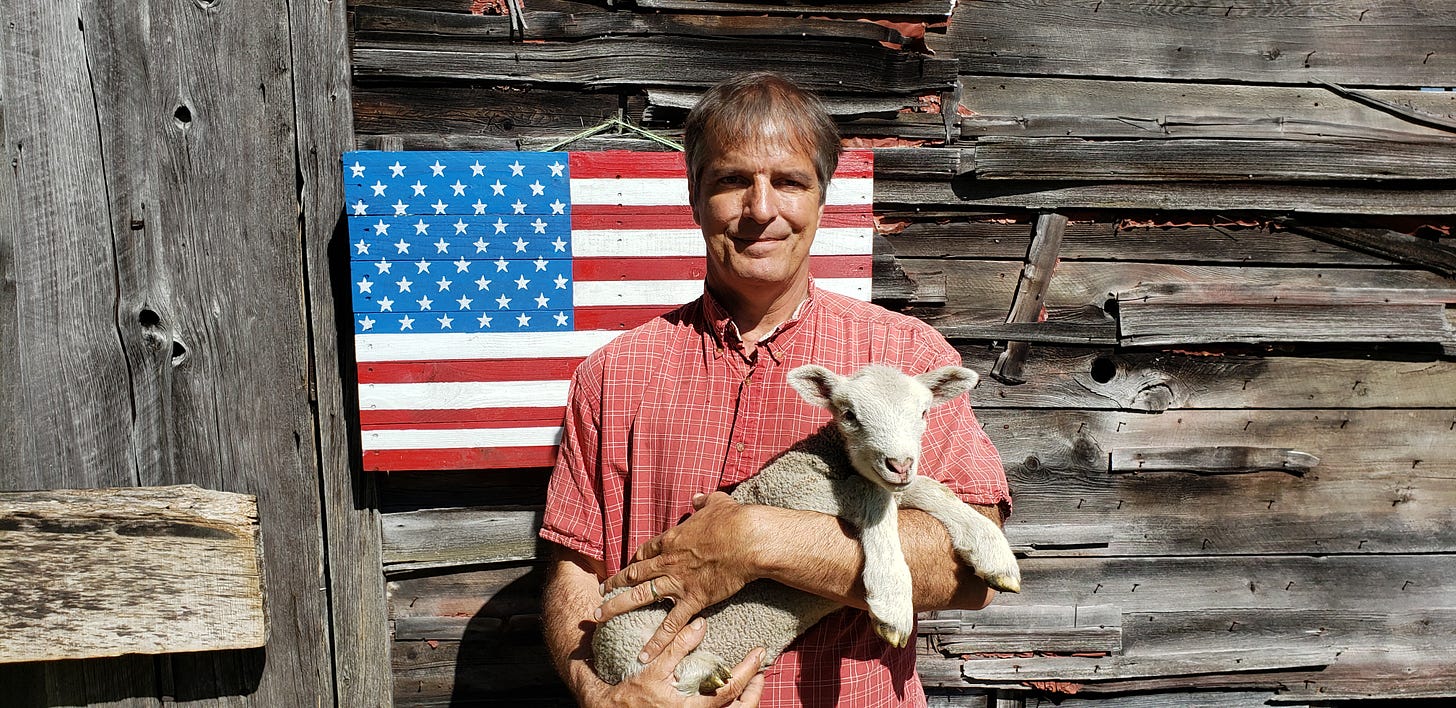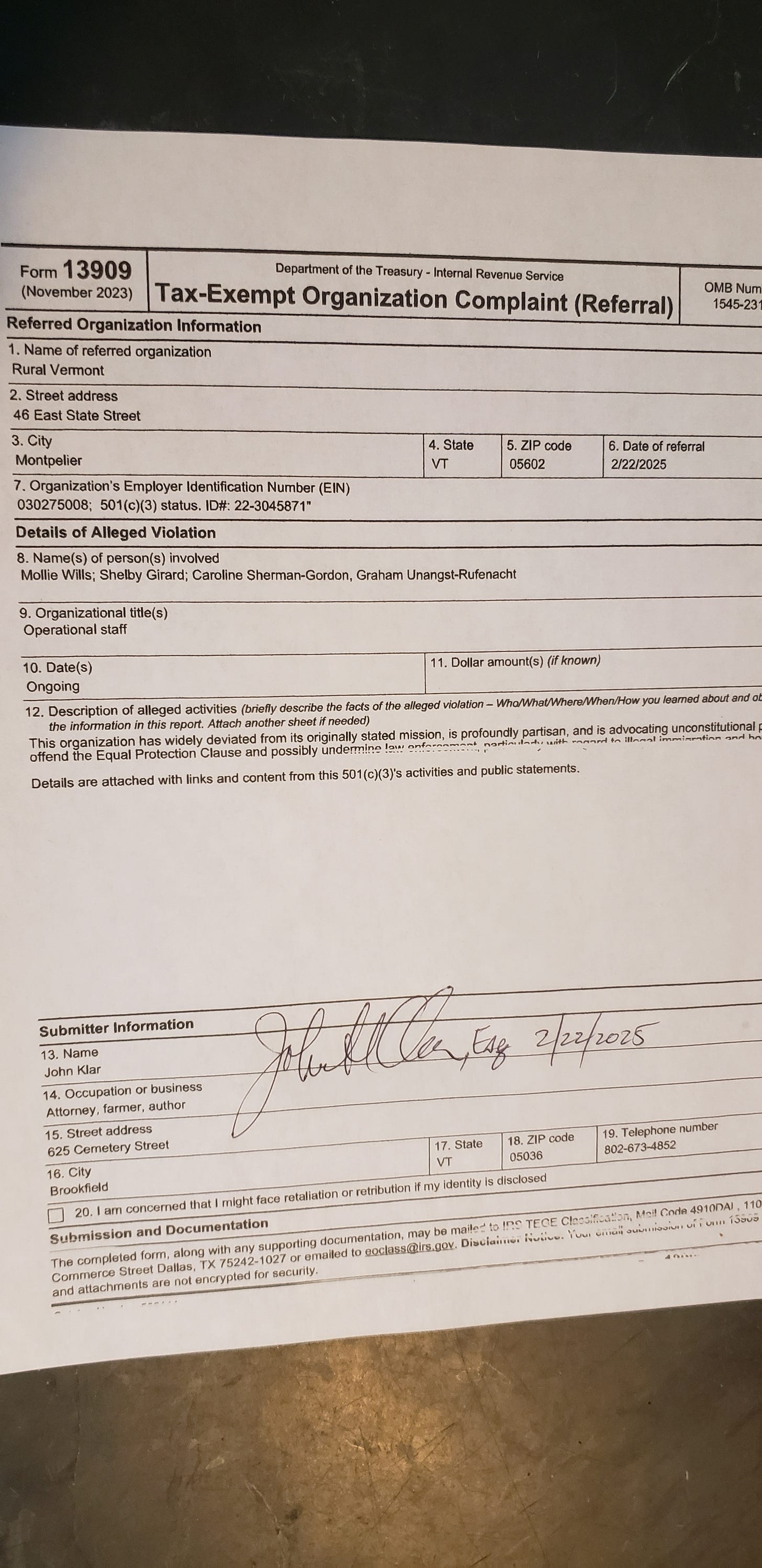The list of Rural Vermont’s insidious offenses against rural Vermonters and real farmers is quite long. I, for one, do not share this Marxist, globalist, racist “vision thing.” I have had enough of the pretend equality, pretend farmer support, and pretend impartiality of an organization that has (in my humble legal opinion as a former tax attorney) abandoned its stated mission and violated the IRS 501(c)(3) conditions required for tax-exempt status. I have filed a Form 13909 Complaint against this organization, displayed below.
(I support my nation, and small farmers!)
IRS rules require a 501(c)(3) entity to abide by certain boundaries in order to receive and maintain the privilege of tax-exempt status. The organization is prohibited from favoring political candidates or parties: it is obvious that Rural Vermont is overtly politically partisan, extolling Biden administration policies and condemning (dishonestly) President Trump’s legitimate, overdue effort to reduce government waste. For authority (and added histrionics), it holds up Democrat Senator Peter Welch as savior. This is certainly not a path to supporting “all” Vermonters.
Rural Vermont’s political activities in support of legislation – including urging membership to support the regressive universal school lunch program, Native American “inclusion,” setting aside public lands to prohibit development, and resisting immigration and law enforcement, are all pushing the 501(c)(3) envelope too far. If they seek to engage in political activity as their primary aim, they must convert to a 501(c)(4) (non-exempt) organization.
The IRS explains this limitation in its publication “How to Lose Your Tax Exempt Status Without Really Trying”:
“Lobbying is when an organization contacts, or urges the public to contact, members or employees of a legislative body (or any executive branch official who may participate in the formulation of legislation) for the purpose of proposing, supporting, or opposing legislation, or when the organization advocates the adoption or rejection of legislation. While a 501(c)(3) organization is allowed to do some lobbying, too much can hurt its tax-exempt status. Its lobbying activities cannot be more than an insubstantial part of its overall activities.”
A final criterion for which an entity can lose its tax-exempt status is “deviation from its charitable, tax-exempt purpose.” As I chronicle here, seeding racist division, advocating for a one-sided, far-left political agenda, and opposing the enforcement of immigration laws are all deviant (and devious) departures from Rural Vermont’s stated mission of supporting regenerative farming and small farms. It should be open and honest about who it really serves rather than beguile Vermonters with claims of unity that are visibly not true.
I asked for my money back from Rural Vermont when I learned it was undermining my effort to preserve on-farm slaughter. I don’t think conservative Vermonters would support this organization if they knew what it has been doing – whether by direct donation or indirectly through their tax dollars. After all, the federal government needs that tax revenue to pay the enormous salaries of the federal employees Rural Vermont claims it is unconstitutional to fire, and the multitude of grants solicited by nonprofs like Rural Vermont.
If Rural Vermont wants to re-create itself as an organization that serves all small Vermont farms rather than weaponize its ideology against us like colonizing woke elitists, it can do so: it has re-purposed its original agricultural mission to instead seed division and racism and funnel money to big-government bureaucrats, so it can reverse course. Until then, I think true rural Vermont includes my white farming forebears who founded and farmed in Brookfield, Vermont (and many other towns) 225 years ago, never took a square foot of ground from Abenakis, supported the Abolitionist movement and equality for all, and suffered intense poverty and deprivations for decades without government rescue or claims of marginalized suffering. My paternal dairy-farm grandmother hails from Sheldon Falls, and her family was of Abenaki descent in St Albans: who is Rural Vermont to speak on behalf of ancient transgressions against my family in order to inflict new ones on me and my children today?
America will likely witness a recurrence of that Great Depression soon, and people will have to come together and feed one another, not label people because of their race, invoke long-dead tribes for exploitation, or milk a government teat to survive. THAT is what rural Vermont once was, not this ideological, taxpayer-subsidized charade that exploits our true heritage for personal wealth and virtue-signaling!
I suggest no one donate to this organization. Let it confine its income to the rich progressives and federal employees it courts and truly works for. If you wish to join me in filing a complaint with the IRS, the necessary information is on the form above, which can be downloaded from the internet and takes about five minutes to complete. I’m sick of fraud in government, and sick of elites riding on the backs of the poor in the name of rescuing them.
Vermont’s dairy farmers are struggling under unsustainable milk prices. The cost of land, equipment, and labor continues to rise. Young farmers cannot afford to enter agriculture, and many small farms are being swallowed by developers or hedge fund-backed “rewilding” projects. Yet instead of fighting for policies that help small farmers survive and thrive, Rural Vermont is focused on race-based cannabis business grants, expanding illegal immigration protections, lobbying for tax increases, and prioritizing Indigenous land access over economic accessibility for all farmers.
Farmers don’t need ideological distractions. We need practical support—lower taxes, affordable land, sustainable markets, and policies that make it easier to farm, not harder. Vermont’s farmers deserve real advocacy, not political distractions. If you support Rural Vermont, take a closer look at what they are actually doing. Ask yourself whether their priorities truly reflect the needs of independent farmers or whether they are more focused on advancing ideological activism.
I once believed Rural Vermont was an ally to farmers. Now, it is clear that its true focus is radical political activism—not agricultural advocacy. If it wants to operate as a lobbying group, it should relinquish its nonprofit status and stop deceiving Vermonters. Until then, farmers must demand real representation, real advocacy, and real accountability.
Instead of donating to Rural Vermont, consider supporting organizations that focus on practical solutions for Vermont farmers. There are many groups that provide real resources, training, and policy advocacy that prioritize agriculture over politics.







VERMONT GOVERNMENTALLY ILL DEMS HAVE COLD ICE ON THEIR BRAINS
Based on their self-described activities and issues on their website, I think you are right in pursuing a possible violation of IRS requirements for 501(c)(3) organizations. They do not have their Form 990 available on their website which is okay (at least I could not locate it) but they must provide it to anyone who makes a formal request. It would be interesting to see how they describe their activities in Part III and the lobbying question in Part IV of Form 990EZ (assuming they qualify to file the EZ form). Having been in the not-for-profit for over 30 years, organizations must take their tax exempt mission seriously not only to meet legal requirements but to demonstrate good faith to their donors/members. This is probably the most important duty of a tax exempt organization board.